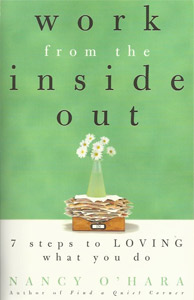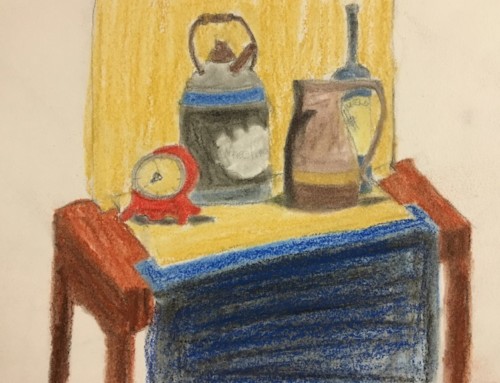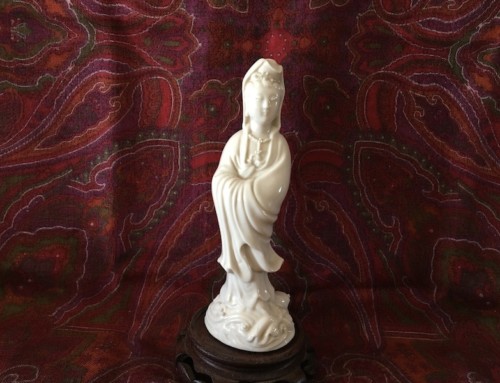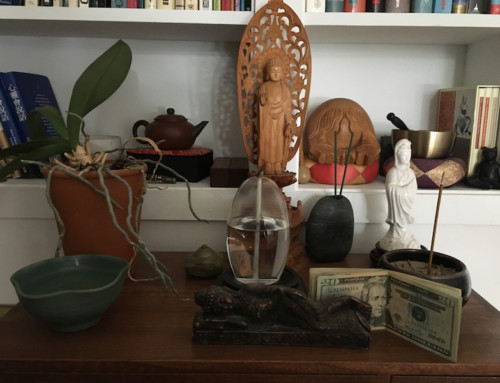Discovery 1:8 – The First Step: Understanding & Acceptance
…continued from 7 Steps to Loving What You Do – Discovery 1:7 – Blaming
You are not separate from your life. Life and the way you live it are not two different things. You do not stand outside your life and watch it happen to you. Your life is you. There is no you beyond your life, beyond what is happening in your life. So throw aside for now the idea that you are merely a pawn, a victim in someone else’s plan for your life. Whether or not you see it now, you are participating in your life. You are not a victim of circumstances.

What’s Next?
And so with work. You are your work. There is not you and then your work. You are not separate from your work. (You disappear and become one with your work.) Work is not simply something you do so that you can live your life, so that you do it and then move on to the important things in life. Work is your life, part of your life anyway, and is not separate from the rest of it, is not something that doesn’t matter, that has no merit, that is just something to get through, to endure. Work in this day and age gets a bad rap. It is said matter-of-factly, as though it were a well known truism, that no one gets to the end of their life, looks back and says, “I wish I had worked more and harder.” Well, why not? (Addiction to work, work as merely an escape from life, is something else entirely; we’ll look at later.)
Work is an estimable act. Work gives us dignity. Work affords us many gifts.
And yet there are many people who detest going to work each day, who cannot wait to retire, to be done with work. They all too often wait for their work to end before beginning to live. Sadly, some die before getting that chance. Feeling victimized by their work, they feel they have no choices, and often become a prisoner of their own mind, not of their employer.
We all have choices. And until we recognize and admit that we have chosen our current situation, we will not be free to choose something else. There are no limits placed on us except those we place on ourselves. Our bosses, our companies, our paychecks do not dictate the rules of the work game. We only decide that they do.
And this doesn’t mean that we should all walk away from our jobs if we feel victimized by them. This doesn’t mean that we should act out at work asserting our power. This doesn’t mean that we can ignore the duties and responsibilities of our job and begin to do things our way. What it does mean is that we can begin to assess how we got where we are, what we’re doing there and what we want going forward. We can take a realistic look at our employers and decide if they truly are our oppressors.
We can move away from the security that comes with being a victim. And we can take responsibility for where we are and what we’re doing.
Walter
Let’s look at Walter. His work life exemplifies how easy it is to get stuck in the role of victim and delude ourselves into thinking that life happens to us, that we neither make nor have any choice in the direction that it takes.
Walter fell into his career after college, the way so many of us do. He liked his field well enough and moved along in it quite nicely. At first he was content to be there and quickly got attached to his paycheck and the other perks of full time employment. In the back of his mind he had plans for his future, which included his real life’s work. He got married, had a few kids, and moved up in the company. He did his job well, got along with his co-workers and superiors and settled into a middle management position. There was some autonomy in his job, which suited Walter because he hated to be told what to do and how to do it. As the years went by, Walter’s world got smaller and smaller and his work options became less and less—at least in his own mind. When Walter reached his mid-forties and found himself with the same company, in the same job, he looked around and wondered how such a fate had come to befall him. Walter had become a disgruntled complainer.
He continued to do his job well enough that the company had no reason to get rid of him, but he began to undermine the company’s efforts. Walter complained to anyone who would listen, inside and outside the company—he had contact with representatives of many businesses that serviced his company—about how stupid and irresponsible upper management was, about how they were destroying the company, about how he was only doing their bidding and if someone didn’t like the work he was producing then they should take it up with them and not him. When asked why he didn’t just leave and find a situation more to his liking, Walter would enumerate the reasons: he had already put in so much time with the company he didn’t want to risk his seniority, the company would never fire him, his family needed this security and he owed it to them, he was too old to start over in a new career, he couldn’t afford it, he didn’t have the energy, he didn’t know what he would do. So he stayed, and stays on to this day, miserable and cranky most of the time. Because Walter feels like a victim he is a victim. But his company is not the victimizer. Walter himself is.
_________________________________________________
- Write a narrative work history of how you got to where you are. Start with your first job. Describe how you viewed each job, what your work dreams and aspirations were and still are, why you made the choices you made, what you liked and disliked about each job. Notice if a distinct pattern begins to emerge as you look at the whole. Write about this.
- Do you feel that you are a victim of society, your employer, your job, your upbringing? Describe why and how this makes you feel. Then look at your part in it. What can you begin to do to change these feelings, to take charge of your own work life? If you don’t know yet, write about that and the possible frustration it causes you. Be patient, in time you will know. Accept where you are today, right now, in this process.
To be continued…
from Work From the Inside Out – 7 Steps to Loving What You Do






Thanks This gave me an appreciation for all the work I’ve done. Just today I rode past a crew working in the cold and said to myself after feeling guilty, you worked for nearly 50 years.